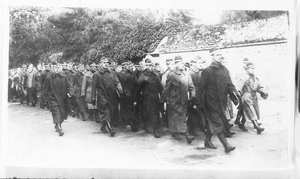[Received November 6, 1917]
Christ Church
October 18, 1917.
Dear Father:
When you are several months from home, and are very busy among new things and sensations, and when you cannot write all the news you want to, it is pretty bad on letters. You see I have not heard from any one since I left the States and I suppose no one has heard from me. There are a million of things I would like to write about, but a great many are tabooed and I cannot take the time now.
Englishmen are strong on discipline and the result is that I only have a chance to do the prescribed motions. Letter writing is not prescribed. So I will eliminate all the interesting details and be general.
Although there are lots of points about our stay here that I used to fuss about, I really do think that it is a fine thing. The school is very good and Englishmen extremely nice and amusing. I always had the idea that English people thought that Americans used a great deal of slang. Well perhaps it is one effect of the war but they surely do use the richest slang here I ever heard. We get a great many lectures by real officers who have worked for months over the lines and they surely are inspiring. We have been so fed up on thrilling war yarns, from officers and men, that we are all expecting to go the limit every day, when we get to the front, and also expect to get by with it. There is some talk of us being instructors in the States. I feel now that such a job would be the last thing to have to do. The dope is that if you can last 2 months at the front you get so clever that the Boche cannot get you, and when you get to be a major you do not fly and are safe.
I am learning a lot about English people and find a lot that fascinates and wins admiration, but you can take it from me that Americans and American ways and the U.S.A. are the ones you want. I can appreciate now why so many people love to travel here, and I surely hope to do it myself. I have been walking and bicycling and rowing as much as I can and love the country very much. Of course, it is all quite different in peace times. Without going into any details you all can be thankful that the U.S. will never get into the condition that this land has.
Last Sunday a bunch of us went to Lady Wm. Osler’s to tea. We met some very charming girls. I feel so much being an untried new-comer that I did not try to get acquainted with any of them. Perhaps I will get airman’s nervous disease and go blithy [sic] in England for a while, and then will be time to say hello to them. (Not serious).
We had a great inspection last Sunday by a bunch of English and American nabob officers. They did not like our looks and now we all have to get tailored uniforms, swanky belts, little triangular caps that stick on one ear and in general have to spend more worry and money on our clothes than we do on our brains.
We have most afternoons from 1:30 to 4 off and I am learning the most thrilling sport of rowing in a single. It really is the king of sports, because it is such good exercise and requires such extreme skill in the application of the power and balancing. I have been out for about 6 miles almost daily this past week.
I am still looking for letters and the watch and underwear from Italy. We may start flying in 3 weeks.
Address c/o American Embassy, London
Love to all,
Parr

Parr’s hostess was Grace Revere Osler. Her husband, Sir William Osler (1849–1919), was one of the founders of the Johns Hopkins School of Medicine in Baltimore. In 1905 he was named Regius Professor of Medicine at Oxford (and was elected a Fellow of Christ Church College). The Oslers were known for their hospitality in both Baltimore and Oxford, where their house was called the “Open Arms.” William Osler wrote around this time to an acquaintance: “Americans are pouring thro. & we catch a glimpse of a few old friends. 250 here in flying corps. We have 30 each Sunday for tea.”90 The Oslers extended this hospitality despite being in mourning. Their son, Edward Revere Osler, a lieutenant in the Royal Field Artillery, died August 30, 1917, in Flanders.91
“blithy” should perhaps have been “blighty,” British World War I slang for (holiday or military leave at ) home (England); if so, Parr has not quite mastered the idiom.